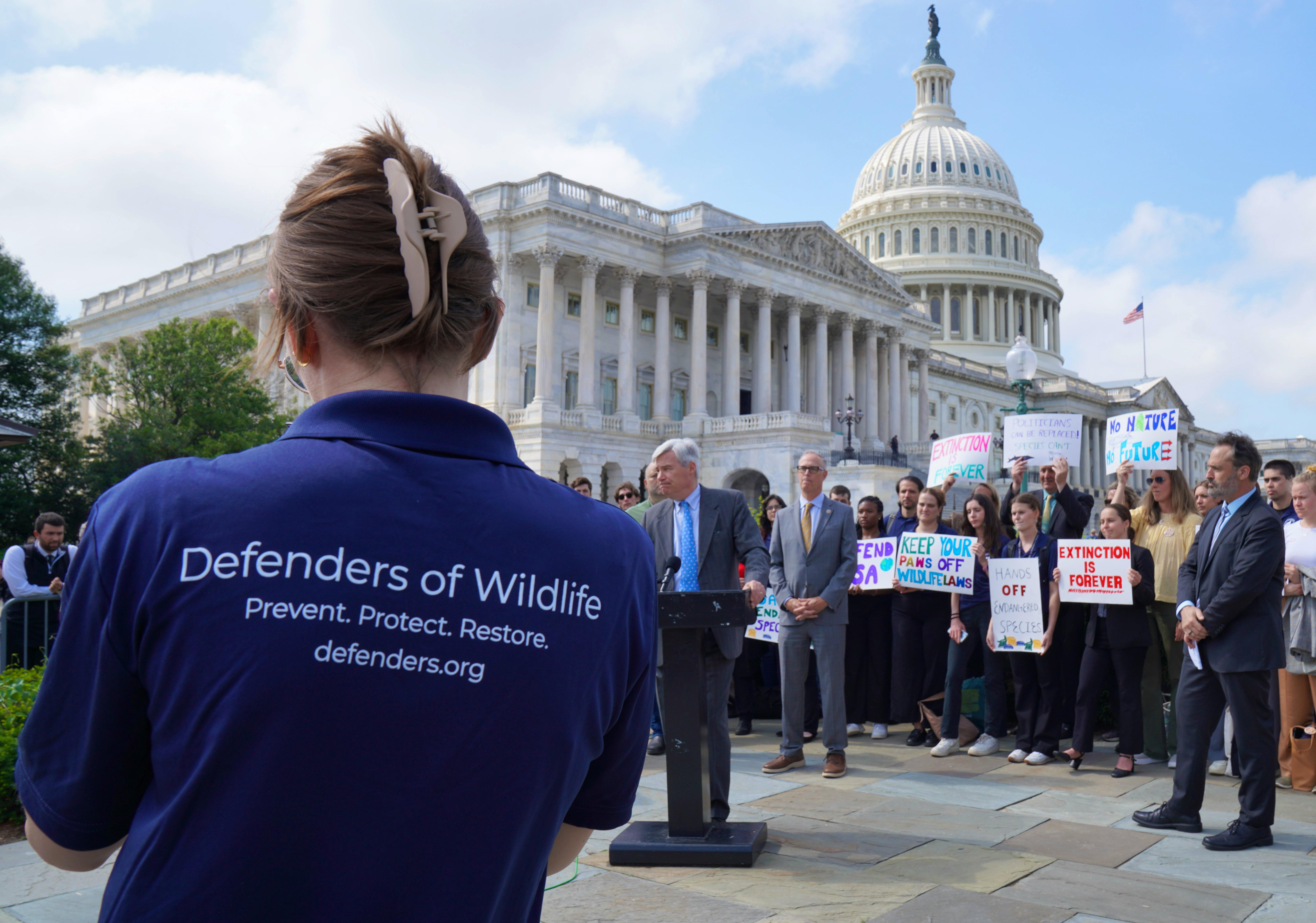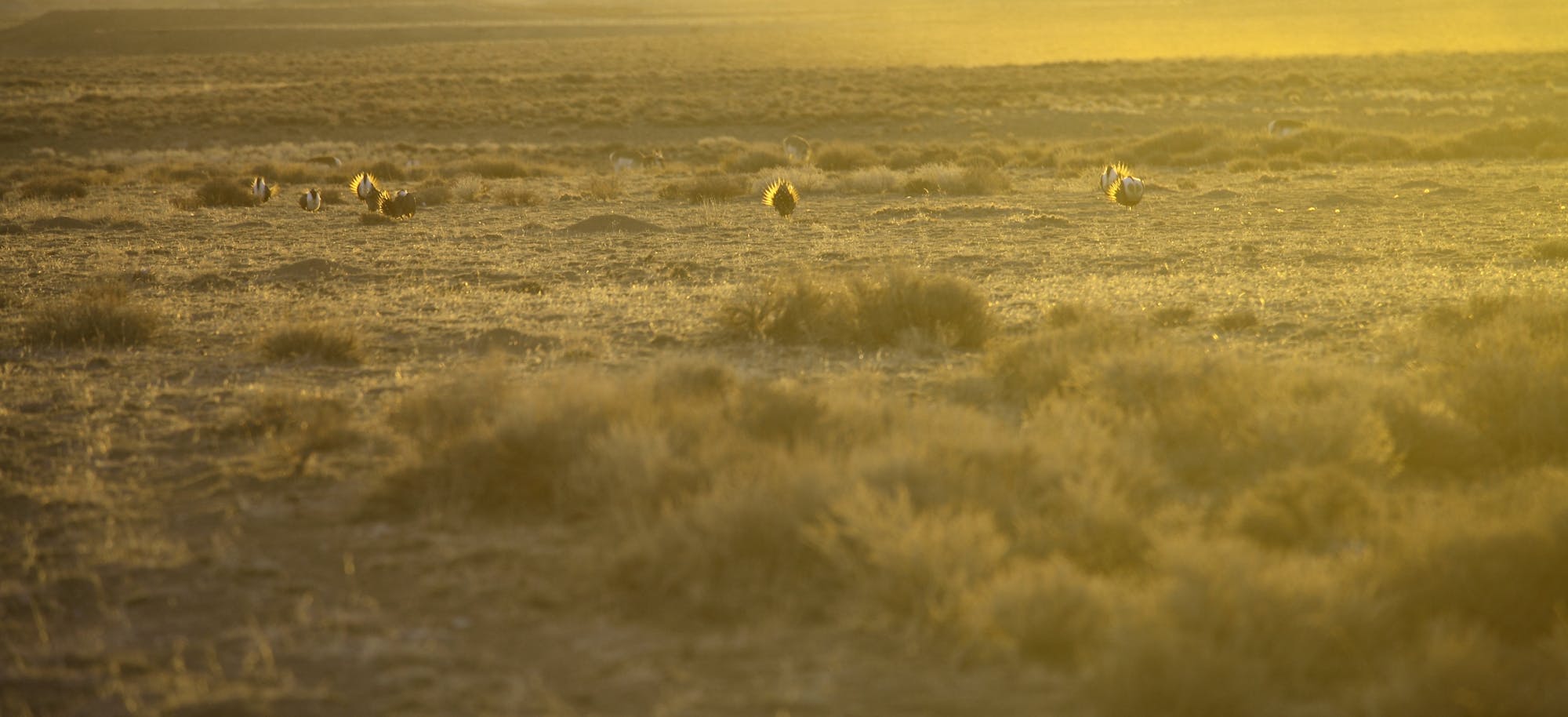Wildlife Defenders feel the urgent call to protect wildlife where they live.
Wildlife Defenders are part of a growing grassroots community speaking up for wildlife at risk of extinction in America. Individuals in this advocate network will have opportunities to utilize a range of tactics to support imperiled animals, cherished landscapes and cornerstone conservation laws. Become a Wildlife Defender today to protect and restore the wildlife and wild places we all love, now and for generations to come.
Questions? Email advocate@defenders.org
"Being a Wildlife Defender has allowed me to engage with my community and protect the animals I love."
-Taylor C, Wildlife Defender
Frequently Asked Questions




Get Started in Advocacy
Are you ready to use your voice as a vehicle for change?
Are you ready to use your voice as a vehicle for change?





Featured Issue
The Endangered Species Act is widely supported by all Americans and is our nation’s most effective tool for saving species at risk of extinction. In fact, with a 99% success rate, it is helping to save over 1,600 imperiled species right here at home. Yet Congress is waging a massive assault on the ESA.
One such threat is the ESA Amendments Act of 2025 (H.R. 1897). This act would gut much of the ESA, warp its foundational reliance on the best available science, increase potential for political interference and drastically reduce protections for our imperiled wildlife.
Wildlife Defenders are using their voices to urge elected officials to oppose the ESA Amendments Act of 2025 and other harmful pieces of legislation.
Social media is an effective way to stay connected with your elected officials. Members of Congress use it to communicate directly with their constituents. You can use it to express your concerns about a particular piece of legislation, ask your elected officials to vote the right way, or generate public praise when a member of Congress casts a pro-conservation vote.

Tagging an elected official in a short post gets your point across quickly, in a concise manner, and can easily be shared by others to amplify your message.
Pictures & Videos Go a Long Way
Post photos or videos to Facebook, X or Instagram of you and a member of Congress at a meeting or of your elected official responding to your question at a town hall. Always tag the elected official and Defenders of Wildlife so we can help amplify your message!




2. Write or Call Your Members of Congress

Writing Your Members of Congress
Whether you are handwriting and mailing a letter, sending an email or signing a postcard, the most important part of your message is the personalization. A personalized communication that expresses your connection to an issue can make a much greater impression.
Writing a letter to your elected official can be one of the most effective choices for communicating with members of Congress, but keep in mind it could take up to six weeks for a letter to reach a Washington, D.C. member’s office due to intensive security screenings. If you are able, consider hand–delivering or mailing your letter to one of their local offices. If you hand deliver your letter, you may have the opportunity to meet with one of the staff members while you’re there! Check your representative’s website for a list of local addresses.

Calling Your Members of Congress
Making a phone call to your elected official is another effective way to share your message. The U.S. Capitol switchboard can be reached at 202-225-3121 and will connect you to your senator or representative's office. When a staff member answers the phone, ask to leave a message for your member of Congress.
Here’s a sample script you can use:
"Hello, my name is [NAME] and I'm from [CITY, STATE]. I'm calling to urge Senator/Representative [NAME] to oppose [BILL #/NAME OF BILL] that would gut the Endangered Species Act. I'm an avid outdoorsman who is thrilled to see bald eagles but also remembers the days when there were no eagles in the skies. Thanks to the ESA — the only law that can save at-risk wildlife from extinction — bald eagles are back and a major draw for enjoying nature in [STATE]. Thank you for your consideration."
Tips for Getting Your Message Across
3. Meet With Your Elected Officials
Elected officials are eager to meet with you, a constituent, regarding your opinions on specific issues. When you meet with your elected official or their staff, your role is to be the “face” of the issue and to provide a local perspective on the positive or negative impacts of a bill on your community or state. Remember, what is most important is your personal story and passion for the issue, not your expertise on all the details.
If you end up meeting with a staff member instead of a member of Congress, don’t be discouraged! Congress members have busy schedules and their staff are their eyes and ears. It is important to develop a strong relationship with this person to ensure your message is delivered to their boss.
Greet and thank your elected official (or their staff), explain your relevance, and make a connection:
"Hello, my name is ____ and I'm from ____ . I work/volunteer/serve/ ____ ."
Make a connection:
"I know your (or your boss) cares about protecting wildlife and wildlife habitat."
Make the ask early:
"Please oppose BILL NUMBER/BILL NAME which weakens protections for endangered species and public lands."
Elaborate and reiterate using a few talking points:
"The Endangered Species Act is our nation’s most effective law for protecting wildlife in danger of extinction. Ninety-nine percent of species listed under the Act have survived, and many are on the path to recovery."
(The most important part of the meeting!) Tell your story. Questions to consider to help you develop your story:
Why does this issue matter to you?
How does this issue impact your district or state?
Reiterate the ask.

Tips for Successful Advocacy in Face-to-Face Meetings
Be Prepared. Learn more about your issue on Defenders of Wildlife's website so you can comfortably speak about the main points. If you need, Defenders can provide you with resources, factsheets, and other information to help you better understand the specifics of your issue. Email advocate@defenders.org to learn more.
Know your elected official. It’s important to learn more about your member of Congress before the meeting. This includes legislative priorities, committee memberships, and/or legislation sponsored or opposed, as well as a bit about their personal side, like do they have a personal connection with wildlife or the outdoors?
Your story matters. Members of Congress and their staffers are focused on dozens of issues every week so it is critical you tell a compelling story. Don’t get lost in the statistics, data or background. Instead, make sure you explain why this issue matters to you and your city or state.
Be truthful. Don’t be afraid to say, “I don’t know.” You want to be viewed as a credible source of information so it’s always better to get back to someone with the correct answer than to be inaccurate. Plus, reaching back out to your elected official provides you with another communication opportunity.
Listen. A successful advocate not only talks but listens and asks questions. Listening allows you to gauge the level of interest and knowledge of the member of Congress or staffer on your issue and provides an opportunity for you to engage in open discussion.
Close with a specific ask. The ask is the most critical part of the meeting. Make sure to request the member or staffer’s commitment on an issue by asking them to support or oppose a bill, join their colleagues on a letter, speak out on the floor, etc.
Follow up. Write a note or send an email to express your thanks for the meeting and repeat your request for a commitment. Also include any additional requested information.
4. Submit a Letter to the Editor
Writing to your local newspaper gives you a chance to speak out directly to your community and state, including elected officials. A published letter can alert others to what’s happening on an under-represented issue or flag lopsided coverage of a topic.
Sample Letter to the Editor:
I always felt calm — safe even — watching dolphins surf the waves and whales breach for air, especially knowing they are safe under the Marine Mammal Protection Act (MMPA). But this peace may be ruptured by a bill Congress is voting on soon. Some members of Congress are looking to “reform” this landmark law, but a closer look would see this draft is a harpoon.
Since the MMPA was enacted in 1972 with wide bipartisan support, no animals in U.S. waters protected under the law’s umbrella have gone extinct. In addition to supporting recovery efforts, the MMPA coordinates with fishermen and scientists to ensure our seafood is harvested sustainably and that marine animals can be enjoyed by all.
We cannot let Congress weaken the MMPA and empty the beautiful life from our oceans. I urge Representative [NAME] to oppose [BILL NAME AND NUMBER] and continue the legacy in protecting our marine wildlife.
Sincerely,
Name
Address
Phone Number
Here are two additional examples of successfully placed LTEs: Full Whale Story, written by Defenders’ staff, and Wise Reintroduction Plan Should Respect Wolves, Ranchers, written by a Defenders’ advocate.
Not ready? There are other ways to get involved.



1. Get Loud on Social